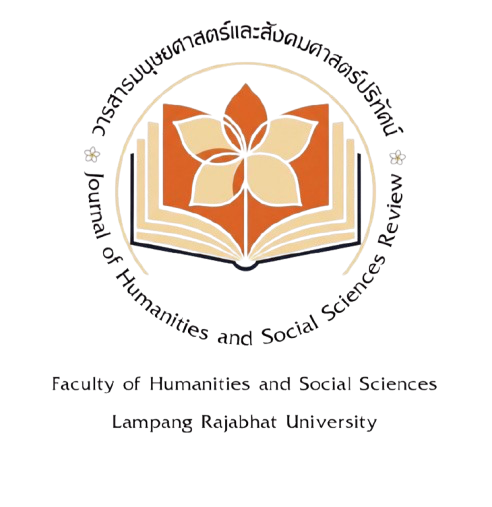The Mechanism for Driving Community-Based Tourism Based on the Philosophy of a Sufficiency Economy for Sustainable Economic Growth of Lampang Province
Keywords:
drive mechanism, community-based tourism, economic growth, Sufficiency Economy PhilosophyAbstract
According to the Sufficiency Economy Philosophy, this article aims to present a mechanism for driving community-based tourism for sustainable economic growth in Lampang Province. It was a qualitative research with 30 key informants selected. The tool used was an interview form with an open-ended structure. Data were collected from documentary studies, interviews, and focus groups. Data were analyzed by content analysis and analytic induction.
The study found that mechanisms of 3 sectors, namely the state, the private sector, and civil society, drive community-based tourism that leads to sustainable economic growth in Lampang Province. The state mechanisms consist of (1) promotion mechanisms, (2) support mechanisms, (3) development mechanisms, (4) coordination mechanisms, (5) advisory mechanisms, and (6) operator mechanisms. As for the private sector, it consists of (1) a budget support mechanism, (2) a community product development mechanism, (3) a marketing channel creation mechanism, (4) a meaningful sign creation mechanism, (5) a community tourism page creation mechanism, and (6) a training mechanism to educate the tourism community with homestay knowledge. Lastly, the civil society consists of (1) a mechanism for coordinating the integration of tourism work with all sectors, (2) a mechanism for finding fund sources to develop tourist attractions, and (3) a mechanism for mentoring or advising. All sectors have focused on an importance of moral conditions that correspond to the Sufficiency Economy Philosophy which depicts an existence of living in non-conflict communities and focusing on the benefit of the community tourism to mutual love, unity, and relationship of the community members to the future generation.
References
เก นันทะเสน และวราภรณ์ นันทะเสน. (2562). การวิเคราะห์ผลของการพัฒนาชุมชนด้วยตัวชี้วัดการพัฒนาที่ยั่งยืน: กรณีศึกษาตำบลแม่แฝก อำเภอสันทราย จังหวัดเชียงใหม่. วารสารเศรษฐศาสตร์และนโยบายสาธารณะ, 10(20). 66-79
คณะอนุกรรมการส่งเสริมการขับเคลื่อนการพัฒนาตามปรัชญาของเศรษฐกิจพอเพียงในภาคการเกษตรและชนบท สำนักงานคณะกรรมการพิเศษเพื่อประสานงานโครงการอันเนื่องมาจากพระราชดำริ (กปร.). (2558). คู่มือการขับเคลื่อนการพัฒนาตามปรัชญาของเศรษฐกิจพอเพียงในภาคเกษตรและชนบท และด้านความมั่นคง. กรุงเทพฯ: คณะอนุกรรมการ.
สมศักดิ์ สามัคคีธรรม. (2563). การท่องเที่ยวโดยชุมชนปรัชญาของเศรษฐกิจพอเพียงและการพัฒนาที่ยั่งยืน. วารสารพัฒนาสังคม, 23(1). 211-225
สำนักงานคณะกรรมการพัฒนาเศรษฐกิจและสังคมแห่งชาติ. (2545). กรอบแนวทางแผนกลยุทธ์แก้ไขปัญหาความยากจน พ.ศ. 2545 - 2549. กรุงเทพฯ: สำนักนายกรัฐมนตรี.
สำนักงานจังหวัดลำปาง. (2566). แผนพัฒนาจังหวัดลำปาง พ.ศ. 2566 – 2570 (ฉบับทบทวน) ประจำปีงบประมาณ พ.ศ.2567. ลำปาง: กลุ่มงานยุทธศาสตร์และข้อมูลเพื่อการพัฒนาจังหวัด
สำนักงานแรงงานจังหวัดลำปาง. (2564). สถานการณ์แรงงานจังหวัดลำปาง (ปี 2563) ฉบับปรับปรุง สืบค้นจาก https://lampang.mol.go.th/wp-content/uploads/sites/27/2021/02/World Bank. (1992). World Development Report 1992. New York: Oxford University.

Downloads
Published
How to Cite
Issue
Section
License
Copyright (c) 2025 Journal of Humanities and Social Sciences Review, Lampang Rajabhat University

This work is licensed under a Creative Commons Attribution-NonCommercial-NoDerivatives 4.0 International License.
This article is published under a Creative Commons Attribution-NonCommercial-NoDerivatives 4.0 International License (CC BY-NC-ND 4.0), which allows others to share the article with proper attribution to the authors and prohibits commercial use or modification. For any other reuse or republication, permission from the journal and the authors is required.


